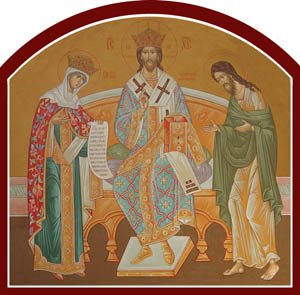Evangelical churches do not impart the same significance to John the Baptist (Forerunner) as does the Orthodox faith. So, I was always puzzled by this seemingly radical statement by Jesus concer
 ning John:
ning John: I tell you, among those born of women there is no one greater than John; yet the one who is the least in the kingdom of God is greater than he. - Luke 7:28
Obviously I was missing something pretty grand in the whole scheme of things for Christ to make such a claim about John. Indeed, in the Orthodox church, where there is an icon of Christ, one often finds an icon of his mother, Mary (Theotokos) on His left and an icon of John the Baptist on His right. Through my reading of the early Church Fathers, I am learning more about the significance of John's role in ushering in the salvation of the human race. John Chrysostom offers a wonderful allegory to help explain one aspect of John's incredible ministry.
...says the Evangelist [the Apostle John], "John stood, and says, Behold, the Lamb of God." Christ utters no word, His messenger says all. So it is with a bridegroom. He says not for a while anything to the bride, but is there in silence, while some show him to the bride, and others give her into his hands; she merely appears, and he departs not having taken her himself, but when he has received her from another who gives her to him. And when he has received her thus given, he so disposes her, that she no more remembers those who betrothed her. So it was with Christ. He came to join to Himself the Church; He said nothing, but merely came. It was His friend, John, who put into His the bride's right hand, when by his discourses he gave into His hand the souls of men. He having received them, afterwards so disposed them, that they departed no more to John who had committed them to Him.
And here we may remark, not this only, but something besides. As at a marriage the maiden goes not to the bridegroom, but he hastens to her, though he be a king's son, and though he be about to espouse some poor and abject person, or even a servant, so it was here. Man's nature did not go up, but contemptible and poor as it was, He came to it, and when the marriage had taken place, He suffered it no longer to tarry here, but having taken it to Himself, transported it to the house of His Father.
- Gospel of John, homily 18
2 comments:
How great the Bridegroom's love!
Wow. Great stuff.
Post a Comment